Fintech Assignment 2: Swiss Fintech and Post-Brexit Environment
VerifiedAdded on 2022/08/20
|9
|2224
|15
Report
AI Summary
This report provides a comprehensive analysis of the Fintech regulatory ecosystem in Switzerland. It begins by defining digital finance and Fintech, highlighting key technologies like IoT, Big Data, and AI. The report then delves into the application of mobile banking apps and online banking within the Swiss context, examining the regulatory framework, including the Fintech license and amendments to the Swiss Financial Banking Ordinance. It assesses the impact of Brexit on the Swiss Fintech sector, particularly concerning cross-border authorization and market access. Furthermore, the report explores current and future Fintech opportunities across various verticals, such as mobile money transfer, virtual financial assistants, and insurance. Finally, it identifies challenges facing the sector, including limited market access and the potential decline in foreign investment due to Brexit. The report concludes by emphasizing the importance of regulatory adaptation and the need for Switzerland to remain competitive in the global Fintech landscape.
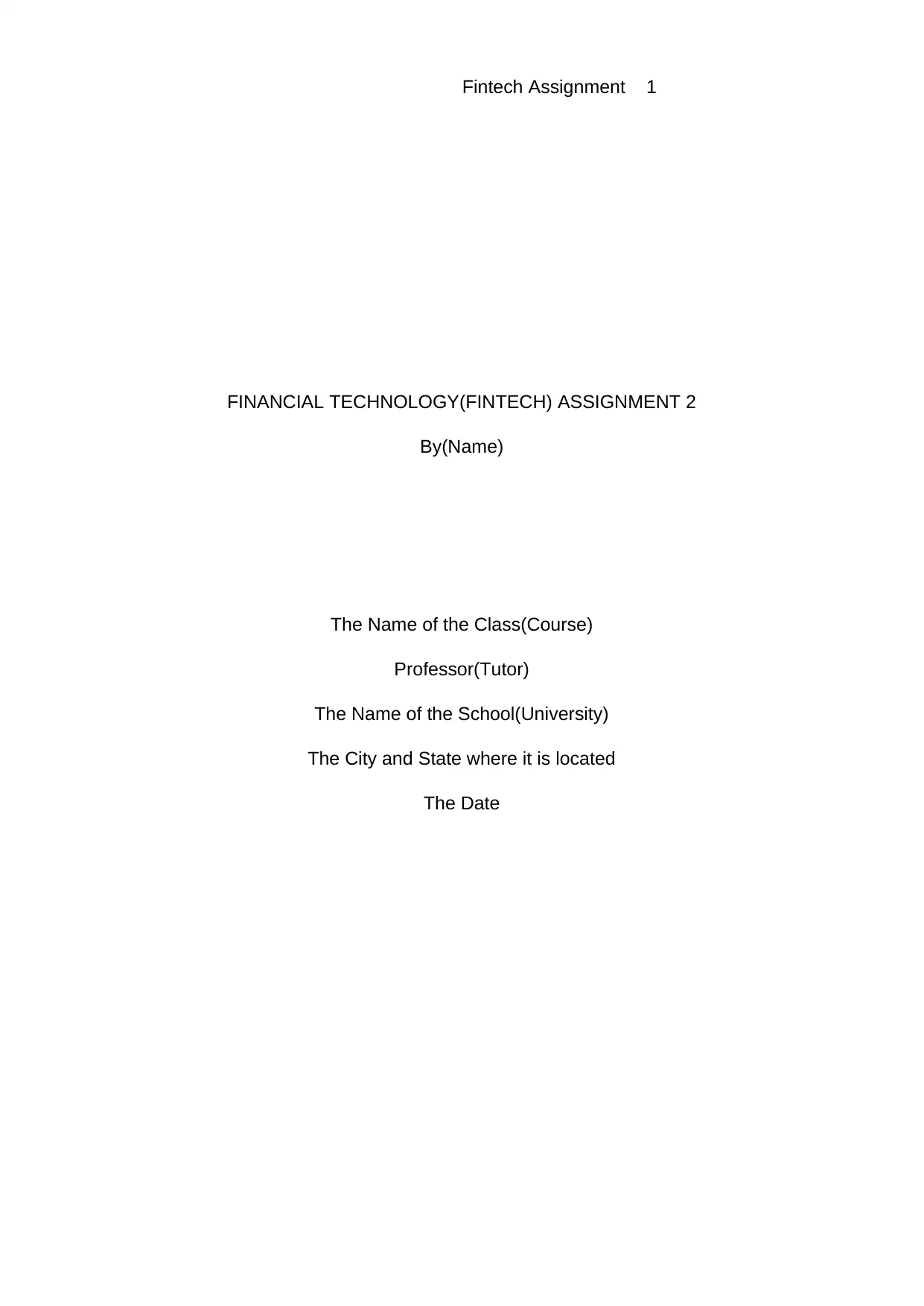
Fintech Assignment 1
FINANCIAL TECHNOLOGY(FINTECH) ASSIGNMENT 2
By(Name)
The Name of the Class(Course)
Professor(Tutor)
The Name of the School(University)
The City and State where it is located
The Date
FINANCIAL TECHNOLOGY(FINTECH) ASSIGNMENT 2
By(Name)
The Name of the Class(Course)
Professor(Tutor)
The Name of the School(University)
The City and State where it is located
The Date
Paraphrase This Document
Need a fresh take? Get an instant paraphrase of this document with our AI Paraphraser
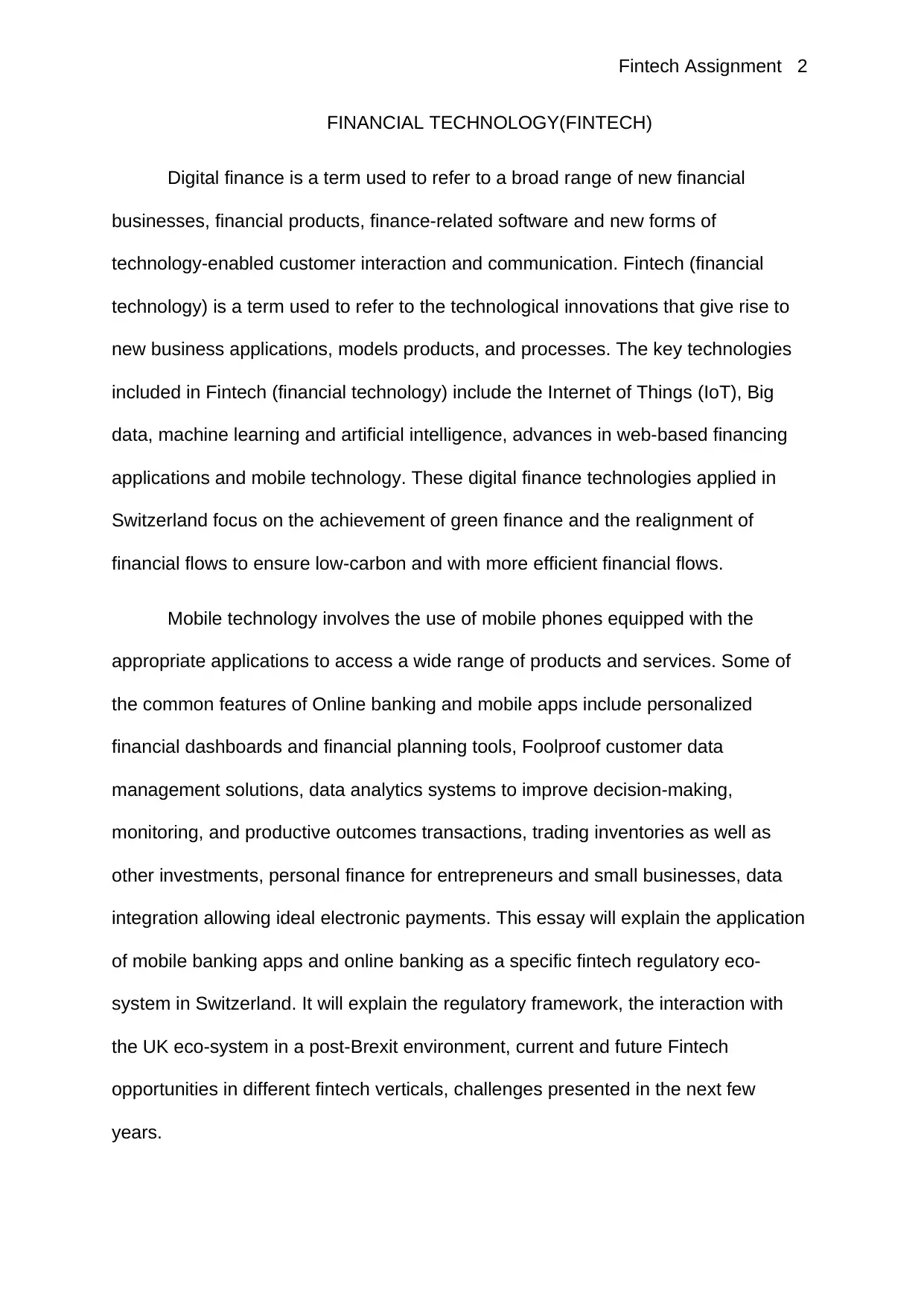
Fintech Assignment 2
FINANCIAL TECHNOLOGY(FINTECH)
Digital finance is a term used to refer to a broad range of new financial
businesses, financial products, finance-related software and new forms of
technology-enabled customer interaction and communication. Fintech (financial
technology) is a term used to refer to the technological innovations that give rise to
new business applications, models products, and processes. The key technologies
included in Fintech (financial technology) include the Internet of Things (IoT), Big
data, machine learning and artificial intelligence, advances in web-based financing
applications and mobile technology. These digital finance technologies applied in
Switzerland focus on the achievement of green finance and the realignment of
financial flows to ensure low-carbon and with more efficient financial flows.
Mobile technology involves the use of mobile phones equipped with the
appropriate applications to access a wide range of products and services. Some of
the common features of Online banking and mobile apps include personalized
financial dashboards and financial planning tools, Foolproof customer data
management solutions, data analytics systems to improve decision-making,
monitoring, and productive outcomes transactions, trading inventories as well as
other investments, personal finance for entrepreneurs and small businesses, data
integration allowing ideal electronic payments. This essay will explain the application
of mobile banking apps and online banking as a specific fintech regulatory eco-
system in Switzerland. It will explain the regulatory framework, the interaction with
the UK eco-system in a post-Brexit environment, current and future Fintech
opportunities in different fintech verticals, challenges presented in the next few
years.
FINANCIAL TECHNOLOGY(FINTECH)
Digital finance is a term used to refer to a broad range of new financial
businesses, financial products, finance-related software and new forms of
technology-enabled customer interaction and communication. Fintech (financial
technology) is a term used to refer to the technological innovations that give rise to
new business applications, models products, and processes. The key technologies
included in Fintech (financial technology) include the Internet of Things (IoT), Big
data, machine learning and artificial intelligence, advances in web-based financing
applications and mobile technology. These digital finance technologies applied in
Switzerland focus on the achievement of green finance and the realignment of
financial flows to ensure low-carbon and with more efficient financial flows.
Mobile technology involves the use of mobile phones equipped with the
appropriate applications to access a wide range of products and services. Some of
the common features of Online banking and mobile apps include personalized
financial dashboards and financial planning tools, Foolproof customer data
management solutions, data analytics systems to improve decision-making,
monitoring, and productive outcomes transactions, trading inventories as well as
other investments, personal finance for entrepreneurs and small businesses, data
integration allowing ideal electronic payments. This essay will explain the application
of mobile banking apps and online banking as a specific fintech regulatory eco-
system in Switzerland. It will explain the regulatory framework, the interaction with
the UK eco-system in a post-Brexit environment, current and future Fintech
opportunities in different fintech verticals, challenges presented in the next few
years.
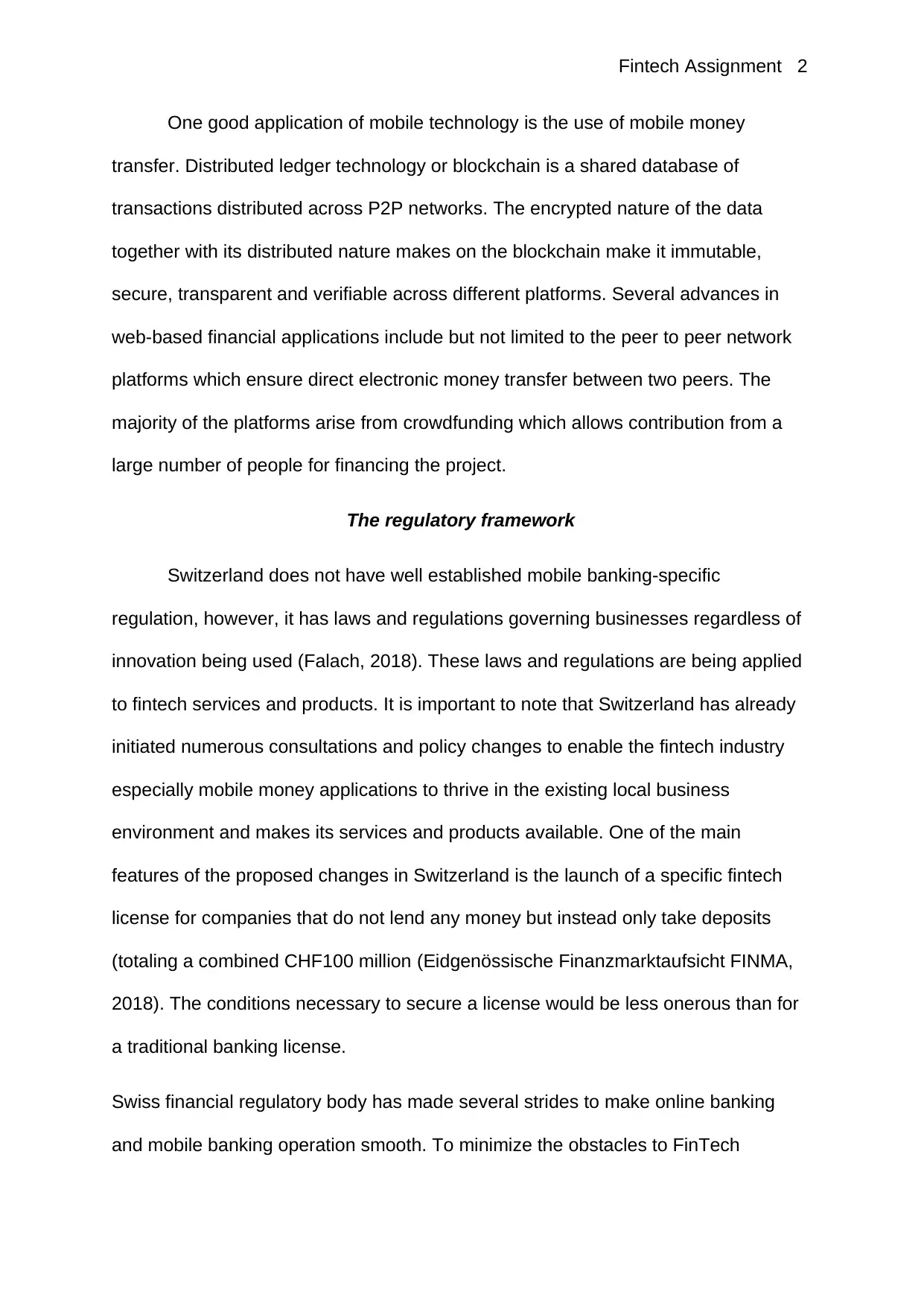
Fintech Assignment 2
One good application of mobile technology is the use of mobile money
transfer. Distributed ledger technology or blockchain is a shared database of
transactions distributed across P2P networks. The encrypted nature of the data
together with its distributed nature makes on the blockchain make it immutable,
secure, transparent and verifiable across different platforms. Several advances in
web-based financial applications include but not limited to the peer to peer network
platforms which ensure direct electronic money transfer between two peers. The
majority of the platforms arise from crowdfunding which allows contribution from a
large number of people for financing the project.
The regulatory framework
Switzerland does not have well established mobile banking-specific
regulation, however, it has laws and regulations governing businesses regardless of
innovation being used (Falach, 2018). These laws and regulations are being applied
to fintech services and products. It is important to note that Switzerland has already
initiated numerous consultations and policy changes to enable the fintech industry
especially mobile money applications to thrive in the existing local business
environment and makes its services and products available. One of the main
features of the proposed changes in Switzerland is the launch of a specific fintech
license for companies that do not lend any money but instead only take deposits
(totaling a combined CHF100 million (Eidgenössische Finanzmarktaufsicht FINMA,
2018). The conditions necessary to secure a license would be less onerous than for
a traditional banking license.
Swiss financial regulatory body has made several strides to make online banking
and mobile banking operation smooth. To minimize the obstacles to FinTech
One good application of mobile technology is the use of mobile money
transfer. Distributed ledger technology or blockchain is a shared database of
transactions distributed across P2P networks. The encrypted nature of the data
together with its distributed nature makes on the blockchain make it immutable,
secure, transparent and verifiable across different platforms. Several advances in
web-based financial applications include but not limited to the peer to peer network
platforms which ensure direct electronic money transfer between two peers. The
majority of the platforms arise from crowdfunding which allows contribution from a
large number of people for financing the project.
The regulatory framework
Switzerland does not have well established mobile banking-specific
regulation, however, it has laws and regulations governing businesses regardless of
innovation being used (Falach, 2018). These laws and regulations are being applied
to fintech services and products. It is important to note that Switzerland has already
initiated numerous consultations and policy changes to enable the fintech industry
especially mobile money applications to thrive in the existing local business
environment and makes its services and products available. One of the main
features of the proposed changes in Switzerland is the launch of a specific fintech
license for companies that do not lend any money but instead only take deposits
(totaling a combined CHF100 million (Eidgenössische Finanzmarktaufsicht FINMA,
2018). The conditions necessary to secure a license would be less onerous than for
a traditional banking license.
Swiss financial regulatory body has made several strides to make online banking
and mobile banking operation smooth. To minimize the obstacles to FinTech
⊘ This is a preview!⊘
Do you want full access?
Subscribe today to unlock all pages.

Trusted by 1+ million students worldwide
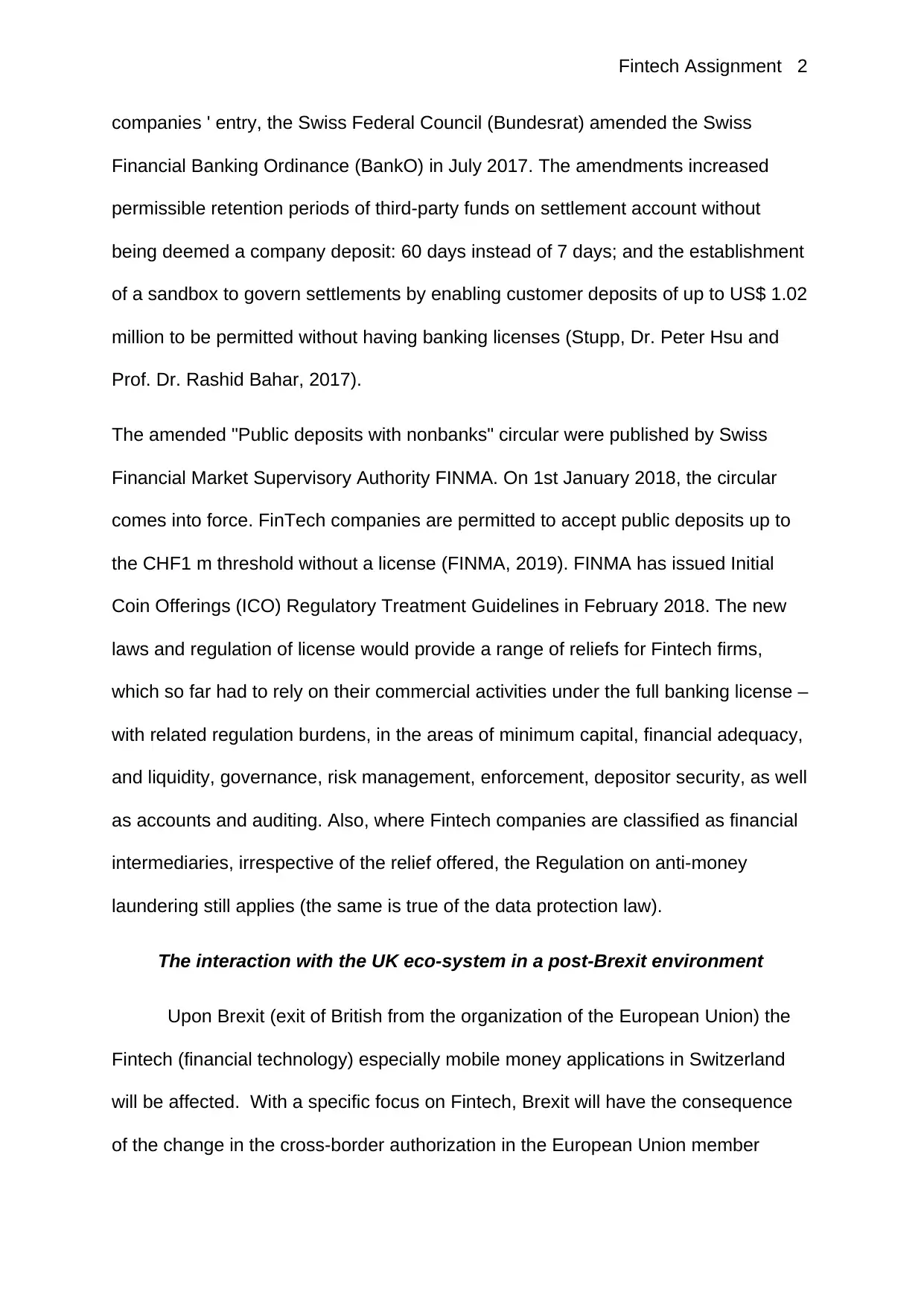
Fintech Assignment 2
companies ' entry, the Swiss Federal Council (Bundesrat) amended the Swiss
Financial Banking Ordinance (BankO) in July 2017. The amendments increased
permissible retention periods of third-party funds on settlement account without
being deemed a company deposit: 60 days instead of 7 days; and the establishment
of a sandbox to govern settlements by enabling customer deposits of up to US$ 1.02
million to be permitted without having banking licenses (Stupp, Dr. Peter Hsu and
Prof. Dr. Rashid Bahar, 2017).
The amended "Public deposits with nonbanks" circular were published by Swiss
Financial Market Supervisory Authority FINMA. On 1st January 2018, the circular
comes into force. FinTech companies are permitted to accept public deposits up to
the CHF1 m threshold without a license (FINMA, 2019). FINMA has issued Initial
Coin Offerings (ICO) Regulatory Treatment Guidelines in February 2018. The new
laws and regulation of license would provide a range of reliefs for Fintech firms,
which so far had to rely on their commercial activities under the full banking license –
with related regulation burdens, in the areas of minimum capital, financial adequacy,
and liquidity, governance, risk management, enforcement, depositor security, as well
as accounts and auditing. Also, where Fintech companies are classified as financial
intermediaries, irrespective of the relief offered, the Regulation on anti-money
laundering still applies (the same is true of the data protection law).
The interaction with the UK eco-system in a post-Brexit environment
Upon Brexit (exit of British from the organization of the European Union) the
Fintech (financial technology) especially mobile money applications in Switzerland
will be affected. With a specific focus on Fintech, Brexit will have the consequence
of the change in the cross-border authorization in the European Union member
companies ' entry, the Swiss Federal Council (Bundesrat) amended the Swiss
Financial Banking Ordinance (BankO) in July 2017. The amendments increased
permissible retention periods of third-party funds on settlement account without
being deemed a company deposit: 60 days instead of 7 days; and the establishment
of a sandbox to govern settlements by enabling customer deposits of up to US$ 1.02
million to be permitted without having banking licenses (Stupp, Dr. Peter Hsu and
Prof. Dr. Rashid Bahar, 2017).
The amended "Public deposits with nonbanks" circular were published by Swiss
Financial Market Supervisory Authority FINMA. On 1st January 2018, the circular
comes into force. FinTech companies are permitted to accept public deposits up to
the CHF1 m threshold without a license (FINMA, 2019). FINMA has issued Initial
Coin Offerings (ICO) Regulatory Treatment Guidelines in February 2018. The new
laws and regulation of license would provide a range of reliefs for Fintech firms,
which so far had to rely on their commercial activities under the full banking license –
with related regulation burdens, in the areas of minimum capital, financial adequacy,
and liquidity, governance, risk management, enforcement, depositor security, as well
as accounts and auditing. Also, where Fintech companies are classified as financial
intermediaries, irrespective of the relief offered, the Regulation on anti-money
laundering still applies (the same is true of the data protection law).
The interaction with the UK eco-system in a post-Brexit environment
Upon Brexit (exit of British from the organization of the European Union) the
Fintech (financial technology) especially mobile money applications in Switzerland
will be affected. With a specific focus on Fintech, Brexit will have the consequence
of the change in the cross-border authorization in the European Union member
Paraphrase This Document
Need a fresh take? Get an instant paraphrase of this document with our AI Paraphraser
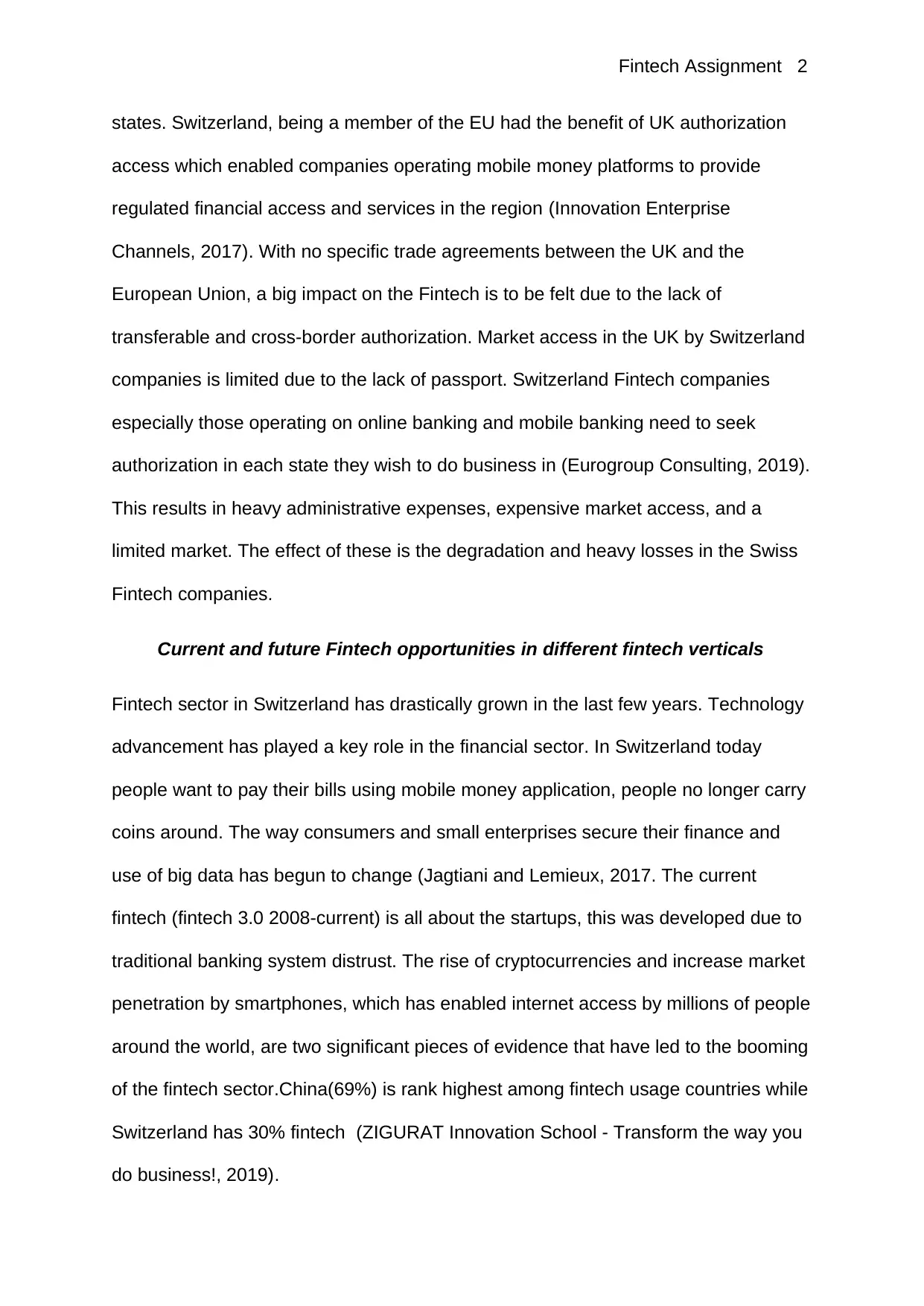
Fintech Assignment 2
states. Switzerland, being a member of the EU had the benefit of UK authorization
access which enabled companies operating mobile money platforms to provide
regulated financial access and services in the region (Innovation Enterprise
Channels, 2017). With no specific trade agreements between the UK and the
European Union, a big impact on the Fintech is to be felt due to the lack of
transferable and cross-border authorization. Market access in the UK by Switzerland
companies is limited due to the lack of passport. Switzerland Fintech companies
especially those operating on online banking and mobile banking need to seek
authorization in each state they wish to do business in (Eurogroup Consulting, 2019).
This results in heavy administrative expenses, expensive market access, and a
limited market. The effect of these is the degradation and heavy losses in the Swiss
Fintech companies.
Current and future Fintech opportunities in different fintech verticals
Fintech sector in Switzerland has drastically grown in the last few years. Technology
advancement has played a key role in the financial sector. In Switzerland today
people want to pay their bills using mobile money application, people no longer carry
coins around. The way consumers and small enterprises secure their finance and
use of big data has begun to change (Jagtiani and Lemieux, 2017. The current
fintech (fintech 3.0 2008-current) is all about the startups, this was developed due to
traditional banking system distrust. The rise of cryptocurrencies and increase market
penetration by smartphones, which has enabled internet access by millions of people
around the world, are two significant pieces of evidence that have led to the booming
of the fintech sector.China(69%) is rank highest among fintech usage countries while
Switzerland has 30% fintech (ZIGURAT Innovation School - Transform the way you
do business!, 2019).
states. Switzerland, being a member of the EU had the benefit of UK authorization
access which enabled companies operating mobile money platforms to provide
regulated financial access and services in the region (Innovation Enterprise
Channels, 2017). With no specific trade agreements between the UK and the
European Union, a big impact on the Fintech is to be felt due to the lack of
transferable and cross-border authorization. Market access in the UK by Switzerland
companies is limited due to the lack of passport. Switzerland Fintech companies
especially those operating on online banking and mobile banking need to seek
authorization in each state they wish to do business in (Eurogroup Consulting, 2019).
This results in heavy administrative expenses, expensive market access, and a
limited market. The effect of these is the degradation and heavy losses in the Swiss
Fintech companies.
Current and future Fintech opportunities in different fintech verticals
Fintech sector in Switzerland has drastically grown in the last few years. Technology
advancement has played a key role in the financial sector. In Switzerland today
people want to pay their bills using mobile money application, people no longer carry
coins around. The way consumers and small enterprises secure their finance and
use of big data has begun to change (Jagtiani and Lemieux, 2017. The current
fintech (fintech 3.0 2008-current) is all about the startups, this was developed due to
traditional banking system distrust. The rise of cryptocurrencies and increase market
penetration by smartphones, which has enabled internet access by millions of people
around the world, are two significant pieces of evidence that have led to the booming
of the fintech sector.China(69%) is rank highest among fintech usage countries while
Switzerland has 30% fintech (ZIGURAT Innovation School - Transform the way you
do business!, 2019).
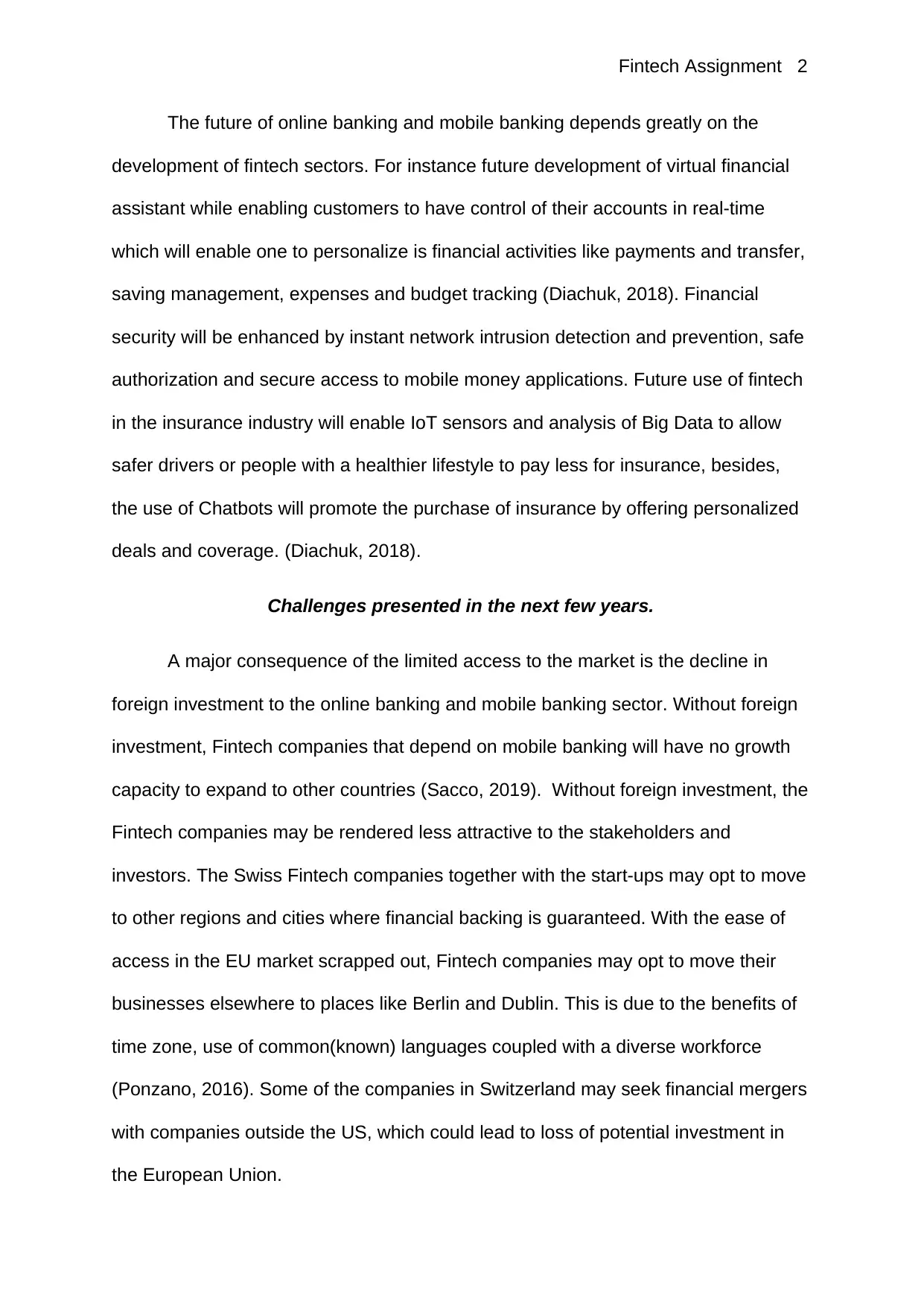
Fintech Assignment 2
The future of online banking and mobile banking depends greatly on the
development of fintech sectors. For instance future development of virtual financial
assistant while enabling customers to have control of their accounts in real-time
which will enable one to personalize is financial activities like payments and transfer,
saving management, expenses and budget tracking (Diachuk, 2018). Financial
security will be enhanced by instant network intrusion detection and prevention, safe
authorization and secure access to mobile money applications. Future use of fintech
in the insurance industry will enable IoT sensors and analysis of Big Data to allow
safer drivers or people with a healthier lifestyle to pay less for insurance, besides,
the use of Chatbots will promote the purchase of insurance by offering personalized
deals and coverage. (Diachuk, 2018).
Challenges presented in the next few years.
A major consequence of the limited access to the market is the decline in
foreign investment to the online banking and mobile banking sector. Without foreign
investment, Fintech companies that depend on mobile banking will have no growth
capacity to expand to other countries (Sacco, 2019). Without foreign investment, the
Fintech companies may be rendered less attractive to the stakeholders and
investors. The Swiss Fintech companies together with the start-ups may opt to move
to other regions and cities where financial backing is guaranteed. With the ease of
access in the EU market scrapped out, Fintech companies may opt to move their
businesses elsewhere to places like Berlin and Dublin. This is due to the benefits of
time zone, use of common(known) languages coupled with a diverse workforce
(Ponzano, 2016). Some of the companies in Switzerland may seek financial mergers
with companies outside the US, which could lead to loss of potential investment in
the European Union.
The future of online banking and mobile banking depends greatly on the
development of fintech sectors. For instance future development of virtual financial
assistant while enabling customers to have control of their accounts in real-time
which will enable one to personalize is financial activities like payments and transfer,
saving management, expenses and budget tracking (Diachuk, 2018). Financial
security will be enhanced by instant network intrusion detection and prevention, safe
authorization and secure access to mobile money applications. Future use of fintech
in the insurance industry will enable IoT sensors and analysis of Big Data to allow
safer drivers or people with a healthier lifestyle to pay less for insurance, besides,
the use of Chatbots will promote the purchase of insurance by offering personalized
deals and coverage. (Diachuk, 2018).
Challenges presented in the next few years.
A major consequence of the limited access to the market is the decline in
foreign investment to the online banking and mobile banking sector. Without foreign
investment, Fintech companies that depend on mobile banking will have no growth
capacity to expand to other countries (Sacco, 2019). Without foreign investment, the
Fintech companies may be rendered less attractive to the stakeholders and
investors. The Swiss Fintech companies together with the start-ups may opt to move
to other regions and cities where financial backing is guaranteed. With the ease of
access in the EU market scrapped out, Fintech companies may opt to move their
businesses elsewhere to places like Berlin and Dublin. This is due to the benefits of
time zone, use of common(known) languages coupled with a diverse workforce
(Ponzano, 2016). Some of the companies in Switzerland may seek financial mergers
with companies outside the US, which could lead to loss of potential investment in
the European Union.
⊘ This is a preview!⊘
Do you want full access?
Subscribe today to unlock all pages.

Trusted by 1+ million students worldwide
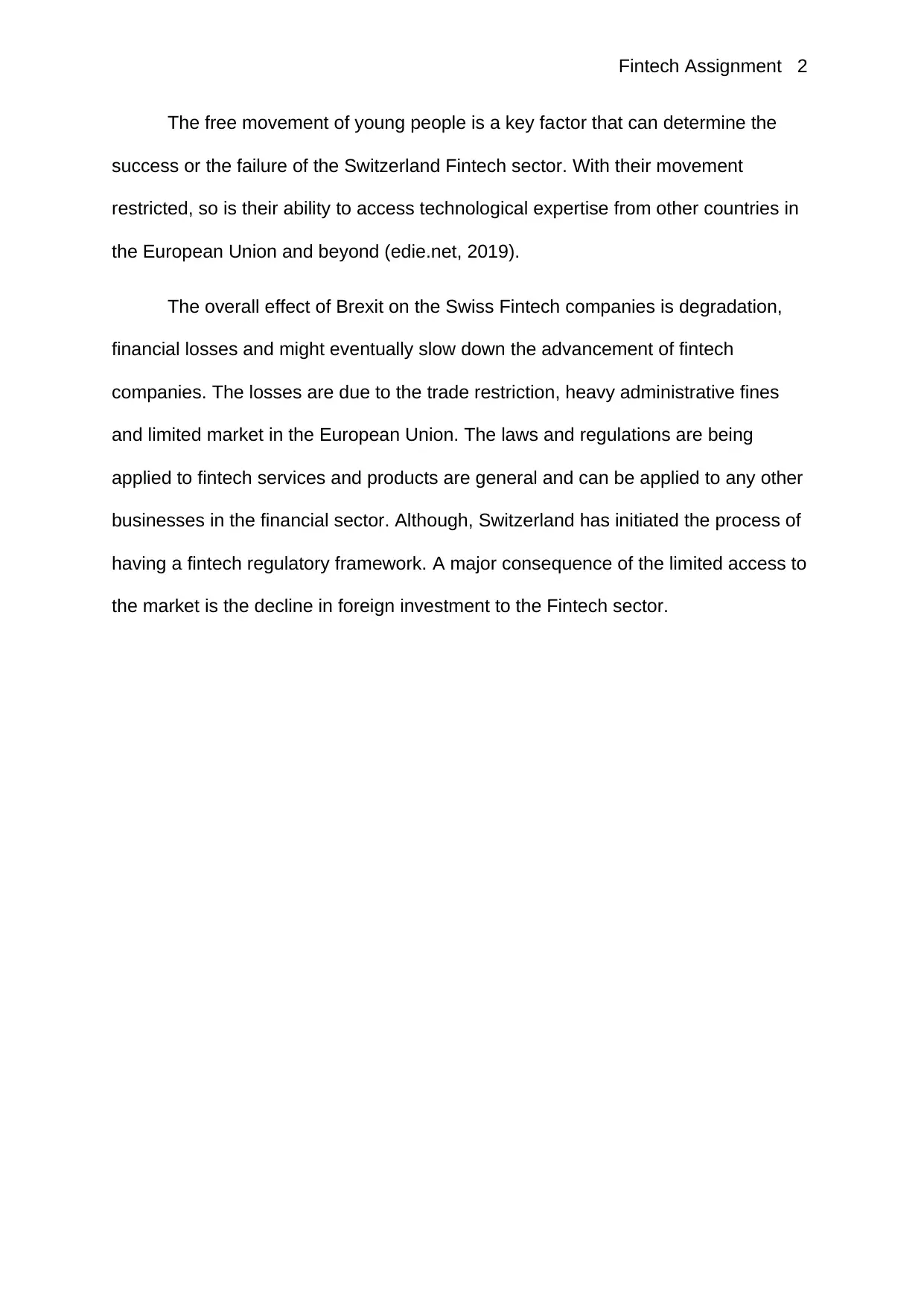
Fintech Assignment 2
The free movement of young people is a key factor that can determine the
success or the failure of the Switzerland Fintech sector. With their movement
restricted, so is their ability to access technological expertise from other countries in
the European Union and beyond (edie.net, 2019).
The overall effect of Brexit on the Swiss Fintech companies is degradation,
financial losses and might eventually slow down the advancement of fintech
companies. The losses are due to the trade restriction, heavy administrative fines
and limited market in the European Union. The laws and regulations are being
applied to fintech services and products are general and can be applied to any other
businesses in the financial sector. Although, Switzerland has initiated the process of
having a fintech regulatory framework. A major consequence of the limited access to
the market is the decline in foreign investment to the Fintech sector.
The free movement of young people is a key factor that can determine the
success or the failure of the Switzerland Fintech sector. With their movement
restricted, so is their ability to access technological expertise from other countries in
the European Union and beyond (edie.net, 2019).
The overall effect of Brexit on the Swiss Fintech companies is degradation,
financial losses and might eventually slow down the advancement of fintech
companies. The losses are due to the trade restriction, heavy administrative fines
and limited market in the European Union. The laws and regulations are being
applied to fintech services and products are general and can be applied to any other
businesses in the financial sector. Although, Switzerland has initiated the process of
having a fintech regulatory framework. A major consequence of the limited access to
the market is the decline in foreign investment to the Fintech sector.
Paraphrase This Document
Need a fresh take? Get an instant paraphrase of this document with our AI Paraphraser
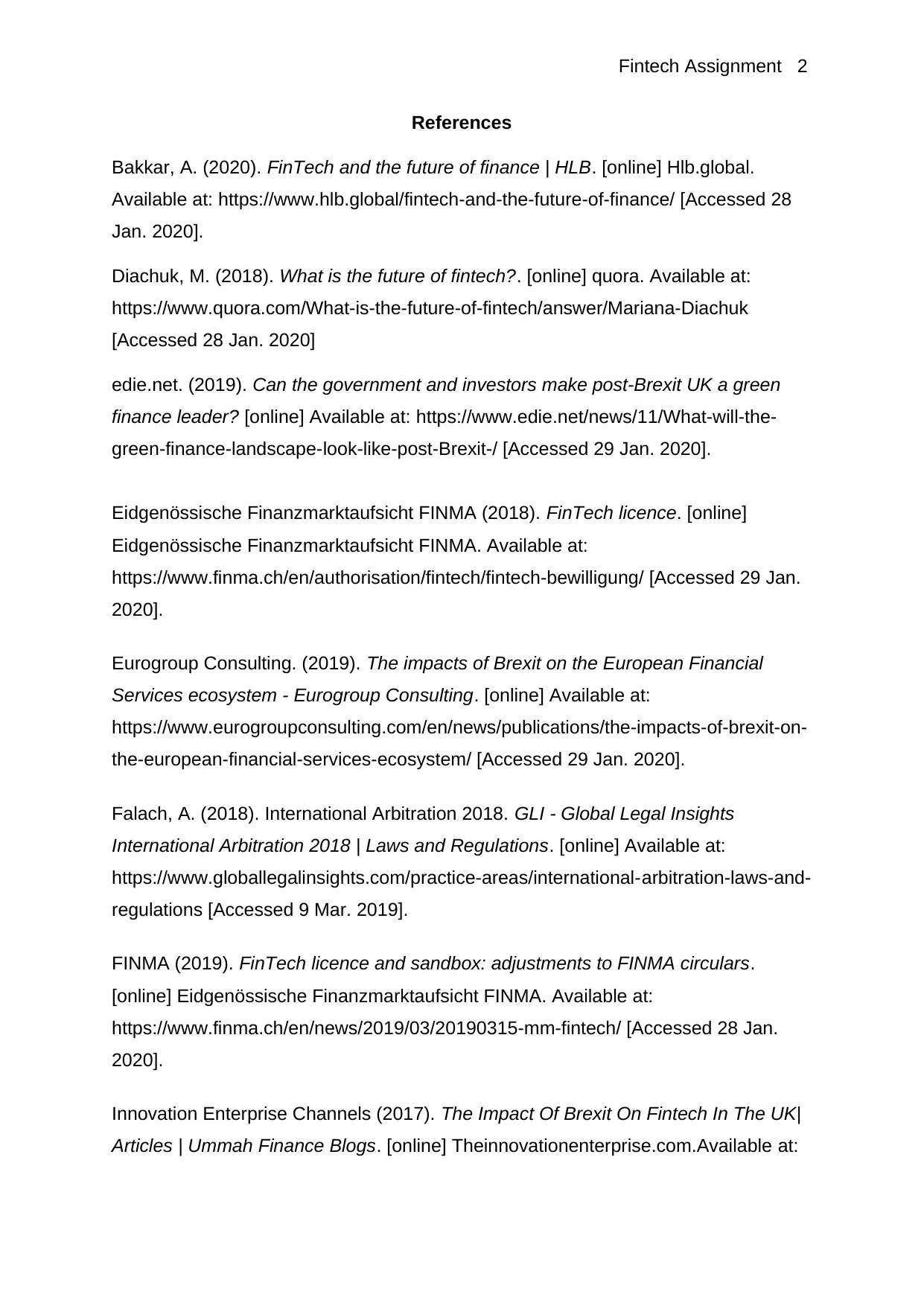
Fintech Assignment 2
References
Bakkar, A. (2020). FinTech and the future of finance | HLB. [online] Hlb.global.
Available at: https://www.hlb.global/fintech-and-the-future-of-finance/ [Accessed 28
Jan. 2020].
Diachuk, M. (2018). What is the future of fintech?. [online] quora. Available at:
https://www.quora.com/What-is-the-future-of-fintech/answer/Mariana-Diachuk
[Accessed 28 Jan. 2020]
edie.net. (2019). Can the government and investors make post-Brexit UK a green
finance leader? [online] Available at: https://www.edie.net/news/11/What-will-the-
green-finance-landscape-look-like-post-Brexit-/ [Accessed 29 Jan. 2020].
Eidgenössische Finanzmarktaufsicht FINMA (2018). FinTech licence. [online]
Eidgenössische Finanzmarktaufsicht FINMA. Available at:
https://www.finma.ch/en/authorisation/fintech/fintech-bewilligung/ [Accessed 29 Jan.
2020].
Eurogroup Consulting. (2019). The impacts of Brexit on the European Financial
Services ecosystem - Eurogroup Consulting. [online] Available at:
https://www.eurogroupconsulting.com/en/news/publications/the-impacts-of-brexit-on-
the-european-financial-services-ecosystem/ [Accessed 29 Jan. 2020].
Falach, A. (2018). International Arbitration 2018. GLI - Global Legal Insights
International Arbitration 2018 | Laws and Regulations. [online] Available at:
https://www.globallegalinsights.com/practice-areas/international-arbitration-laws-and-
regulations [Accessed 9 Mar. 2019].
FINMA (2019). FinTech licence and sandbox: adjustments to FINMA circulars.
[online] Eidgenössische Finanzmarktaufsicht FINMA. Available at:
https://www.finma.ch/en/news/2019/03/20190315-mm-fintech/ [Accessed 28 Jan.
2020].
Innovation Enterprise Channels (2017). The Impact Of Brexit On Fintech In The UK|
Articles | Ummah Finance Blogs. [online] Theinnovationenterprise.com.Available at:
References
Bakkar, A. (2020). FinTech and the future of finance | HLB. [online] Hlb.global.
Available at: https://www.hlb.global/fintech-and-the-future-of-finance/ [Accessed 28
Jan. 2020].
Diachuk, M. (2018). What is the future of fintech?. [online] quora. Available at:
https://www.quora.com/What-is-the-future-of-fintech/answer/Mariana-Diachuk
[Accessed 28 Jan. 2020]
edie.net. (2019). Can the government and investors make post-Brexit UK a green
finance leader? [online] Available at: https://www.edie.net/news/11/What-will-the-
green-finance-landscape-look-like-post-Brexit-/ [Accessed 29 Jan. 2020].
Eidgenössische Finanzmarktaufsicht FINMA (2018). FinTech licence. [online]
Eidgenössische Finanzmarktaufsicht FINMA. Available at:
https://www.finma.ch/en/authorisation/fintech/fintech-bewilligung/ [Accessed 29 Jan.
2020].
Eurogroup Consulting. (2019). The impacts of Brexit on the European Financial
Services ecosystem - Eurogroup Consulting. [online] Available at:
https://www.eurogroupconsulting.com/en/news/publications/the-impacts-of-brexit-on-
the-european-financial-services-ecosystem/ [Accessed 29 Jan. 2020].
Falach, A. (2018). International Arbitration 2018. GLI - Global Legal Insights
International Arbitration 2018 | Laws and Regulations. [online] Available at:
https://www.globallegalinsights.com/practice-areas/international-arbitration-laws-and-
regulations [Accessed 9 Mar. 2019].
FINMA (2019). FinTech licence and sandbox: adjustments to FINMA circulars.
[online] Eidgenössische Finanzmarktaufsicht FINMA. Available at:
https://www.finma.ch/en/news/2019/03/20190315-mm-fintech/ [Accessed 28 Jan.
2020].
Innovation Enterprise Channels (2017). The Impact Of Brexit On Fintech In The UK|
Articles | Ummah Finance Blogs. [online] Theinnovationenterprise.com.Available at:
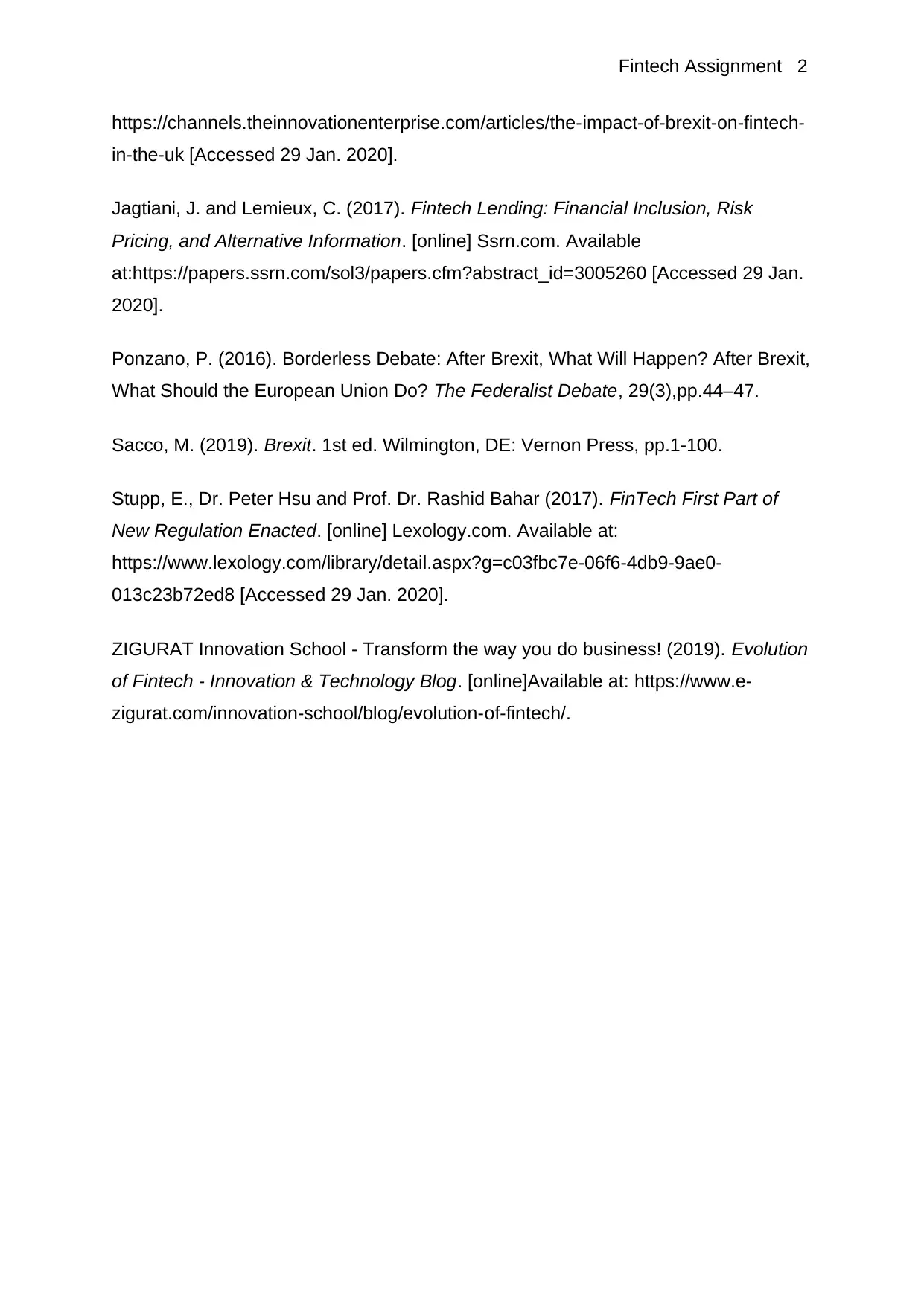
Fintech Assignment 2
https://channels.theinnovationenterprise.com/articles/the-impact-of-brexit-on-fintech-
in-the-uk [Accessed 29 Jan. 2020].
Jagtiani, J. and Lemieux, C. (2017). Fintech Lending: Financial Inclusion, Risk
Pricing, and Alternative Information. [online] Ssrn.com. Available
at:https://papers.ssrn.com/sol3/papers.cfm?abstract_id=3005260 [Accessed 29 Jan.
2020].
Ponzano, P. (2016). Borderless Debate: After Brexit, What Will Happen? After Brexit,
What Should the European Union Do? The Federalist Debate, 29(3),pp.44–47.
Sacco, M. (2019). Brexit. 1st ed. Wilmington, DE: Vernon Press, pp.1-100.
Stupp, E., Dr. Peter Hsu and Prof. Dr. Rashid Bahar (2017). FinTech First Part of
New Regulation Enacted. [online] Lexology.com. Available at:
https://www.lexology.com/library/detail.aspx?g=c03fbc7e-06f6-4db9-9ae0-
013c23b72ed8 [Accessed 29 Jan. 2020].
ZIGURAT Innovation School - Transform the way you do business! (2019). Evolution
of Fintech - Innovation & Technology Blog. [online]Available at: https://www.e-
zigurat.com/innovation-school/blog/evolution-of-fintech/.
https://channels.theinnovationenterprise.com/articles/the-impact-of-brexit-on-fintech-
in-the-uk [Accessed 29 Jan. 2020].
Jagtiani, J. and Lemieux, C. (2017). Fintech Lending: Financial Inclusion, Risk
Pricing, and Alternative Information. [online] Ssrn.com. Available
at:https://papers.ssrn.com/sol3/papers.cfm?abstract_id=3005260 [Accessed 29 Jan.
2020].
Ponzano, P. (2016). Borderless Debate: After Brexit, What Will Happen? After Brexit,
What Should the European Union Do? The Federalist Debate, 29(3),pp.44–47.
Sacco, M. (2019). Brexit. 1st ed. Wilmington, DE: Vernon Press, pp.1-100.
Stupp, E., Dr. Peter Hsu and Prof. Dr. Rashid Bahar (2017). FinTech First Part of
New Regulation Enacted. [online] Lexology.com. Available at:
https://www.lexology.com/library/detail.aspx?g=c03fbc7e-06f6-4db9-9ae0-
013c23b72ed8 [Accessed 29 Jan. 2020].
ZIGURAT Innovation School - Transform the way you do business! (2019). Evolution
of Fintech - Innovation & Technology Blog. [online]Available at: https://www.e-
zigurat.com/innovation-school/blog/evolution-of-fintech/.
⊘ This is a preview!⊘
Do you want full access?
Subscribe today to unlock all pages.

Trusted by 1+ million students worldwide
1 out of 9
Related Documents
Your All-in-One AI-Powered Toolkit for Academic Success.
+13062052269
info@desklib.com
Available 24*7 on WhatsApp / Email
![[object Object]](/_next/static/media/star-bottom.7253800d.svg)
Unlock your academic potential
Copyright © 2020–2026 A2Z Services. All Rights Reserved. Developed and managed by ZUCOL.





